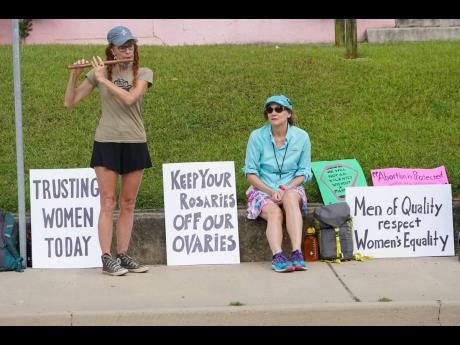Michael Abrahams | Abortion: Why aren’t men being addressed?
Abortion is a process that affects women and their bodies. Yes, it involves embryos and foetuses too, but these are in a woman’s body, so any process affecting them ultimately affects a woman’s body as well. If we aim to reduce abortion rates,...
Abortion is a process that affects women and their bodies. Yes, it involves embryos and foetuses too, but these are in a woman’s body, so any process affecting them ultimately affects a woman’s body as well.
If we aim to reduce abortion rates, female sexual behaviour must be addressed. And it is. Anti-abortion advocates are quick to criticise women and their behaviour that leads to the unwanted pregnancies that end up being aborted. Having unprotected sex, engaging in sex with multiple partners while not taking steps to avoid pregnancy, and other choices women make are commonly brought to the fore and roundly condemned.
But human females are not capable of parthenogenesis. In other words, they do not reproduce by themselves.
FACTOR GREATLY
With the exception of assisted reproductive techniques and the rare instances where ejaculation takes place at the entrance of the vagina and results in a pregnancy, conception occurs after penile-vaginal sexual intercourse.
In most cases where consensual sexual intercourse of this type occurs, it is the male who initiates it. Conception can also occur after non-consensual heterosexual sex, meaning rape. In these cases, the male is nearly always the aggressor. When sex occurs after coercion or manipulation, men are more likely to be the culprits than women. Pregnancy can also occur when a man or a boy removes a condom without his partner’s consent or deliberately ejaculates inside her against her wishes, or when he penetrates her while she is sleeping.
Males factor greatly in the equation regarding the genesis of pregnancies. So, why aren’t the anti-abortion folks addressing males and their sexual behaviour? It is easy to scrutinise the behaviour of women who choose abortion, and label them as careless, irresponsible and immoral. But what about the behaviour of the men who impregnate them?
When the power dynamic of heterosexual relationships is examined, the power balance usually rests in favour of the men. We live in a world where men are often referred to as the head of the household, and it is the man who often call the shots. Men often earn more, and are usually physically stronger and able to overpower and subdue their female partners. When intimate-partner violence takes place in heterosexual relationships, the females are more likely to be the victims.
So, why aren’t people who claim to be pro-life talking to and calling out boys and men about not respecting the principles of consent and respecting boundaries, as stridently as they rebuke women for their actions? Why are they not encouraging males to wear condoms and respect the wishes of women who request withdrawal, or that they not remove condoms during sex? Why are they not telling men to not prohibit their partners from using contraceptives, or undergoing tubal ligation if they wish? Why are they not calling out men who are married, or in established relationships, who impregnate women outside and demand that they have an abortion, and, in some cases, threaten to harm them if they do not? Why aren’t they telling men who are in relationships, or have children, or have women carrying pregnancies for them, to be up front with other women they are having sex with, as the discovery of these situations after conception may influence a woman’s decision to abort her pregnancy?
NEGATIVE CONSEQUENCES
The influence of men is not restricted to their sexual behaviour. Research has repeatedly shown that the absence of fathers and appropriate male role models in the lives of girls is associated with many negative consequences. Among these are an increased risk of early sexual activity and unplanned and unwanted pregnancies, which, not uncommonly, end in abortion. So, why isn’t the anti-abortion lobby vociferously pleading with men to be present and act responsibly when they have children?
Why do these people only have strength for women? Are they afraid of taking on men? Their failure to address men and their behaviour exposes a significant and unreasonable bias against women. It is as if men are absolved of all responsibility when, in many cases, male behaviour is a contributing factor to the woman’s decision to seek an abortion. These men face no judgement, no physical pain, no mental anguish, no stigma. When they walk away from a woman and the pregnancies they cause, they usually face no consequences, while the women remain in situations that have the potential to negatively, and sometimes permanently, affect their physical, mental, emotional, social and financial well-being.
This is, of course, not always the case. There are instances where men are traumatised when women abort pregnancies caused by them. Their pain is real, and they are deserving of empathy. It would be unfair and disingenuous to blame men for all abortions.
That being said, the glaring dearth of the contribution of men’s behaviour in the narratives of the anti-abortion lobby supports the belief that those who stridently support strict anti-abortion laws, and desire to criminalise women who have abortions, may not only be concerned about ‘life’, but are also hell-bent on controlling women and their bodies.
The role of men in situations that lead to abortion is undeniable. If the anti-abortion lobby honestly wants to stop abortions, they need to have serious and fulsome conversations with men.
Michael Abrahams is an obstetrician and gynaecologist, social commentator and human-rights advocate. Send feedback to columns@gleanerjm.com and michabe_1999@hotmail.com, or follow him on Twitter @mikeyabrahams.

